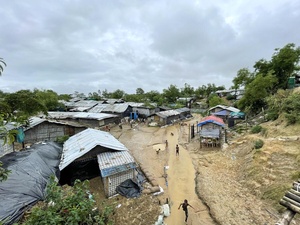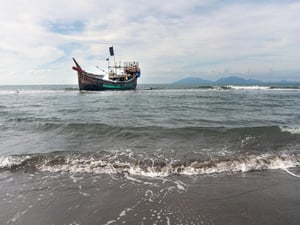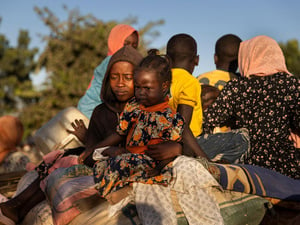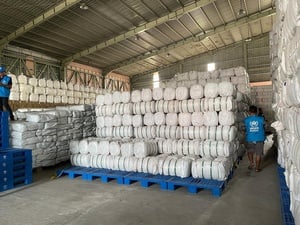Growing numbers risk crossing Bay of Bengal in search of safety, better life
Growing numbers risk crossing Bay of Bengal in search of safety, better life

Last year, thousands of people risked boat journeys on the Bay of Bengal, including people fleeing violence in Myanmar, like these people.
YANGON, Myanmar, January 11 (UNHCR) - The UN refugee agency said on Friday that growing numbers of people are risking their lives on smugglers' boats in the Bay of Bengal following the recent violence in Myanmar's Rakhine state and as frustration mounts over the lack of imminent solutions to their plight.
Just one week into the new year, UNHCR has had reports that more than 2,000 people have left northern Rakhine state and Bangladesh on big boats run by smuggling rings. Their final destination is uncertain, although they are believed to be heading to other countries in South-east Asia.
These most recent reports add to what is already thought to be a record number of people who have reportedly made the dangerous journey in recent months. Last year, an estimated 13,000 people headed into the Bay of Bengal on smugglers' boats. Among them are Muslims from Rakhine state, long-staying refugees in Bangladesh and Bangladeshis.
Most appear to be men travelling alone, but there are believed to be increasing numbers of women and children - often an indicator of growing desperation and lack of prospects. At least 485 people are believed to have died or remain missing in four reported boat accidents in the Bay of Bengal last year. The real death toll could be much higher.
There are unconfirmed reports in the media that smuggled passengers who make it to land are increasingly being detained by smugglers' networks on the Thailand-Malaysia border. The smugglers make their passengers call relatives in Bangladesh to demand money for the rest of the journey. If payment is not made, the passengers typically face being sold to trafficking networks as bonded labourers on fishing boats until they can pay off their debts.
It is unclear how many actually make it to their final destinations, where they often risk arrest, detention and possible forced return to Myanmar. UNHCR continues to seek access to individuals arriving by boat who are arrested and detained by government authorities.
"In Thailand, we have asked for access to newly-arrived people from Myanmar and are awaiting a response from the authorities. In Malaysia, UNHCR systematically requests and is typically granted access to individuals arriving by boat. Our office there is eventually able to secure their release from detention if they are deemed to be people of concern to UNHCR," a spokesman for the refugee agency said.
UNHCR fears that more people could take the dangerous sea voyage, driven by desperation after inter-communal violence broke out in Rakhine state in June and October last year. Some 115,000 people remain displaced within the state.
In neighbouring Bangladesh, there is also a growing sense of hopelessness among the refugees who have fled from Myanmar since the early 1990s. Some 30,000 refugees are hosted in two official camps while a larger number of Muslims from Rakhine are living in squalid makeshift sites and among the local communities.
"This growing boatpeople crisis calls for regional approaches and solutions. UNHCR encourages the government of Myanmar to intensify measures to address some of the main push factors," the spokesman said, adding that this included "the lack of sustainable development and the resulting widespread poverty, the lack of rights for an important part of the population and recognition of the economic interdependence of all communities in Rakhine state."
At the same time, UNHCR is urging countries in the region to maintain open borders and ensure humane treatment and access by UNHCR to people seeking asylum. UNHCR stands ready to support states in assisting people in need of international protection. UNHCR also appeals to sea captains to continue the long tradition of rescue at sea for boats that are in distress.
In March, UNHCR will co-organize a regional roundtable on irregular maritime movements in the Asia-Pacific, bringing together governments, relevant organizations and other stakeholders to discuss practical regional approaches to the problem. It is hoped that the forum will serve as a launching pad for concrete actions by states in the region to enhance regional dialogue and improve responses to irregular maritime movements.








